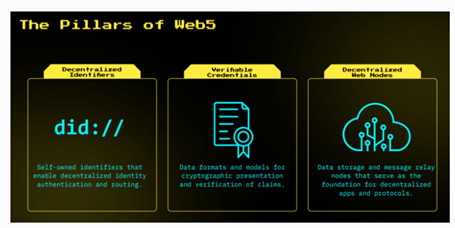

14th June 2022 (7 Topics)
Context
Former Twitter CEO Jack Dorsey recently announced his vision for a new decentralized web platform that is being called Web 5.0.
- It is being built with an aim to return “ownership of data and identity to individuals”.
About
Web 5.0:
- “Web5 is a Decentralized Web Platform that enables developers to leverage Decentralized Identifiers, Verifiable Credentials, and Decentralized Web Nodes to write Decentralized Web Apps, returning ownership and control over identity and data to individuals”.
- Web 5.0 is being developed by former Twitter CEO Jack Dorsey's Bitcoin business unit, The Block Head.
- Web 1.0 was the first generation of the global digital communications network.
- It is often referred to as the “read-only” Internet made of static web-pages that only allowed for passive engagement.
- Web 2.0 was the “read and write” Internet.
- Users were now able to communicate with servers and other users leading to the creation of the social web.
- This is the World Wide Web that we use today.
- Web 3.0 is an evolving term that is used to refer to the next generation of Internet – a “read-write-execute” web – with decentralization as its bedrock.
- Web 5.0 is aimed at “building an extra decentralized web that puts you in control of your data and identity”.
- Simply put, Web 5.0 is Web 2.0 plus Web 3.0 that will allow users to ‘own their identity’ on the Internet and ‘control their data’.
- Both Web 3.0 and Web 5.0 envision an Internet without threat of censorship – from governments or big tech, and without fear of significant outages.
The evolution:
- The term Web 2.0 was coined for the first time by Darcy DiNucci in 1999 when talking about the future of the Web.
- While Web 1.0 was the beginning of the internet where users could only engage with content in a passive way (reading or viewing), Web 2.0 gave a path to a new way for people on the internet to engage in different activities.
- For example, rather than simply reading a website, people could comment, give an opinion or interact with those creating content.
- Web 3.0 started when blockchain technology appeared, even without people, developers and companies knowing what was yet to come.
- The first time that the term Web3 was used was when the co-founder of Ethereum, the second largest cryptocurrency in the world, Gavin Wood talked about it in
- Compared to Web 2.0 where people were just uploading content to different centralized platforms, it is nowadays possible to earn digital things and prove ownership of these things.
- For example, non-fungible tokens are a clear example of this.
- NFTs, despite the fact that they were popularized with CryptoKitties and memes, are a clear example of how virtual things and objects can exist without the need of relying on centralized networks or parties.
- Web5’s goal is to create a unique set of tools based on Bitcoin that would change the financial system as we know it today.
- This would not only allow investors and individuals to protect and own their data, but they would also keep control over all their interactions.
- The pillars of Web5 include self-owned identifiers that enable decentralized identity authentication and routing, verifiable credentials as data formats and models for cryptographic presentation and verification of claims, and decentralized web nodes (data storage and message relay nodes).



